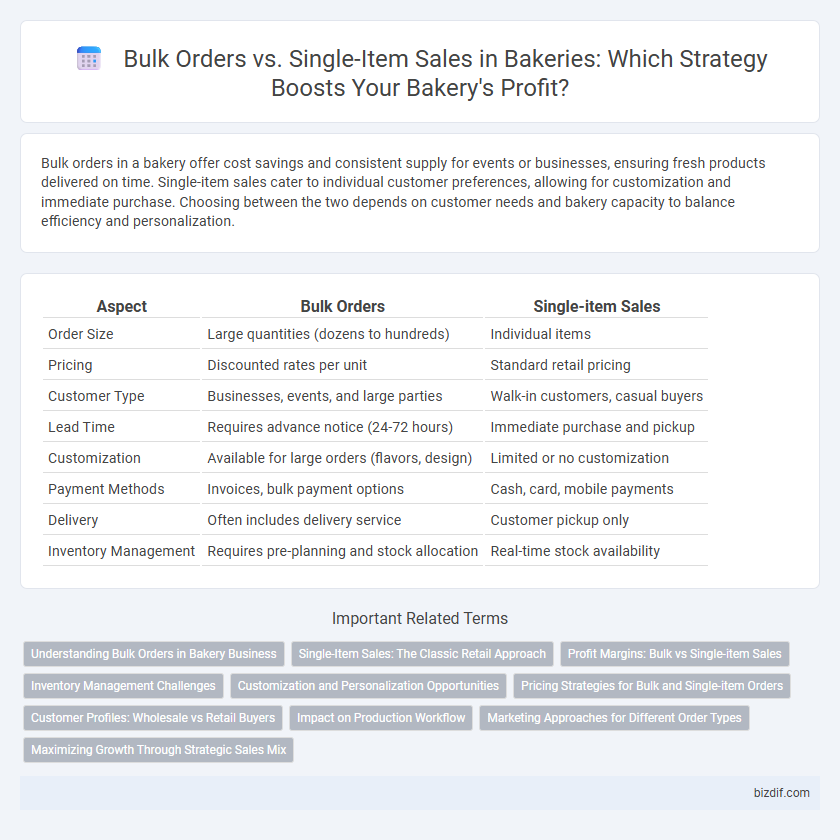Bulk orders in a bakery offer cost savings and consistent supply for events or businesses, ensuring fresh products delivered on time. Single-item sales cater to individual customer preferences, allowing for customization and immediate purchase. Choosing between the two depends on customer needs and bakery capacity to balance efficiency and personalization.
Table of Comparison
| Aspect | Bulk Orders | Single-item Sales |
|---|---|---|
| Order Size | Large quantities (dozens to hundreds) | Individual items |
| Pricing | Discounted rates per unit | Standard retail pricing |
| Customer Type | Businesses, events, and large parties | Walk-in customers, casual buyers |
| Lead Time | Requires advance notice (24-72 hours) | Immediate purchase and pickup |
| Customization | Available for large orders (flavors, design) | Limited or no customization |
| Payment Methods | Invoices, bulk payment options | Cash, card, mobile payments |
| Delivery | Often includes delivery service | Customer pickup only |
| Inventory Management | Requires pre-planning and stock allocation | Real-time stock availability |
Understanding Bulk Orders in Bakery Business
Bulk orders in a bakery business involve large quantities of products, typically for events, corporate functions, or retail partnerships, enabling cost efficiency in production and pricing. Understanding customer demand patterns and production capacity is crucial for managing inventory and minimizing waste while fulfilling bulk requests. Offering bulk orders can increase revenue streams, improve cash flow, and enhance customer relationships by providing tailored solutions for high-volume needs.
Single-Item Sales: The Classic Retail Approach
Single-item sales represent the classic retail approach in bakeries, catering to walk-in customers seeking immediate consumption or small quantities. This method allows bakeries to showcase a wide variety of freshly baked goods like pastries, bread, and cakes, enhancing customer experience through variety and convenience. Pricing strategies for single-item sales often emphasize impulse buying and retail margins, making it a crucial revenue stream for daily operations.
Profit Margins: Bulk vs Single-item Sales
Bulk orders in bakeries often yield higher profit margins due to reduced packaging and delivery costs per unit, enabling economies of scale that single-item sales cannot match. Single-item sales typically incur higher overhead expenses and lower per-unit revenue, but they attract walk-in customers seeking convenience and immediate purchase. Balancing bulk orders and single-item sales is essential for optimizing overall profitability and inventory management in bakery operations.
Inventory Management Challenges
Managing inventory for bulk orders requires precise forecasting to avoid overstocking perishable ingredients and minimize waste. Single-item sales demand flexible inventory systems that can quickly respond to variable customer preferences and daily demand fluctuations. Balancing these approaches ensures efficient supply chain operations and reduces the risk of stockouts or excess inventory in a bakery setting.
Customization and Personalization Opportunities
Bulk orders in bakery settings offer extensive customization and personalization options, allowing clients to tailor flavors, designs, and packaging to suit events or branding needs. Single-item sales typically provide limited customization but cater to spontaneous purchases and individual preferences with ready-to-eat options. Prioritizing bulk orders enhances customer satisfaction through bespoke creations, while single-item sales focus on convenience and immediate gratification.
Pricing Strategies for Bulk and Single-item Orders
Pricing strategies for bulk orders in bakeries often include volume discounts to attract larger purchases, reducing the per-unit cost and encouraging customer loyalty. Single-item sales typically feature higher per-item prices to cover packaging, handling, and the convenience of smaller quantities, balancing profitability with customer accessibility. Implementing tiered pricing allows bakeries to optimize revenue by catering to both occasional buyers and bulk clients efficiently.
Customer Profiles: Wholesale vs Retail Buyers
Wholesale buyers prioritize bulk orders to secure consistent supply for businesses like cafes, grocery stores, or event planners, emphasizing cost-effectiveness and reliable delivery schedules. Retail buyers typically seek single-item sales for personal consumption, valuing freshness, variety, and convenience in smaller quantities. Understanding these distinct customer profiles helps bakeries tailor marketing strategies, inventory management, and pricing structures to meet diverse client needs efficiently.
Impact on Production Workflow
Bulk orders streamline production workflow by allowing bakeries to plan ingredient procurement, baking schedules, and packaging processes more efficiently, reducing waste and labor costs. Single-item sales demand flexible and varied baking schedules, which can increase setup times, ingredient changes, and potential for production bottlenecks. Managing bulk orders versus single-item sales requires balancing consistent output with the agility to meet diverse customer preferences.
Marketing Approaches for Different Order Types
Marketing strategies for bulk orders emphasize personalized service, volume discounts, and long-term client relationships to attract corporate clients and event planners. Single-item sales focus on impulse buying, visually appealing displays, and social media promotions targeting individual customers and walk-ins. Tailoring promotional tactics based on purchase behavior enhances customer acquisition and maximizes bakery revenue streams.
Maximizing Growth Through Strategic Sales Mix
Maximizing bakery growth requires balancing bulk orders and single-item sales to optimize revenue streams and customer reach. Bulk orders provide steady cash flow and attract corporate or event clients, while single-item sales drive walk-in traffic and impulse purchases. Strategic pricing and promotional tactics for each channel enhance overall profitability and market presence.
Bulk Orders vs Single-item Sales Infographic

 bizdif.com
bizdif.com